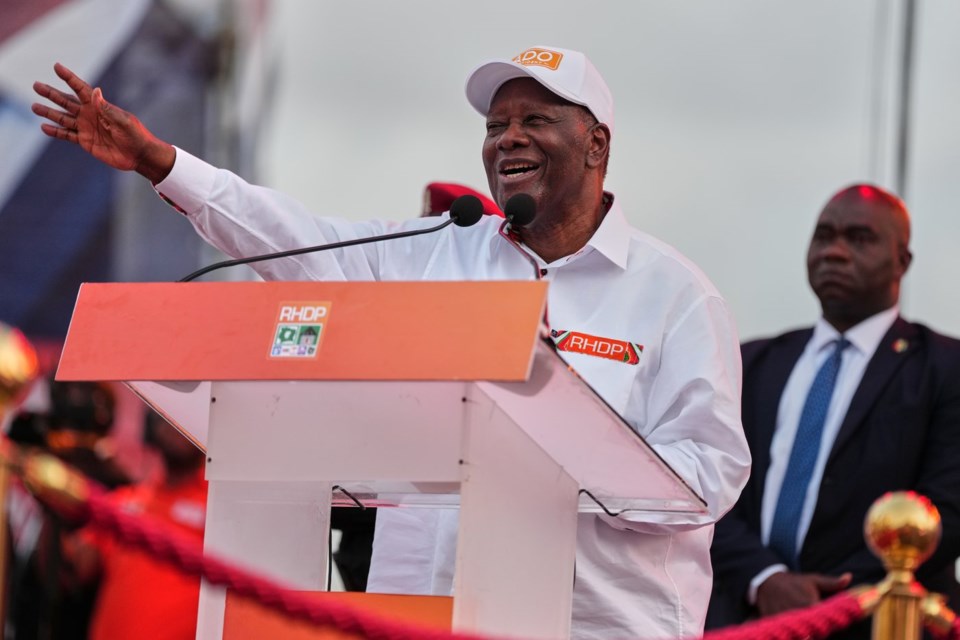Top Stories
Polls Open in Ivory Coast as Ouattara Aims for Fourth Term

Polls opened in the Ivory Coast on March 30, 2024, as President Alassane Ouattara seeks a fourth term amid significant political tension. The election follows the exclusion of key opposition candidates, including Tidjane Thiam, a former executive at Credit Suisse, and Laurent Gbagbo, a former president who still commands substantial support. Voting commenced at 08:00 GMT and is set to conclude at 18:00 GMT, with approximately 8.7 million citizens registered to cast their ballots.
Turnout in the last two elections has been slightly above 50%, raising concerns about voter engagement. The counting of votes will begin as soon as the polls close, with provisional results anticipated within 48 hours. This election highlights the ongoing trend of long-standing leaders maintaining power in Africa, a continent with the youngest population globally. Other notable aging leaders include Paul Biya of Cameroon, aged 92, and Yoweri Museveni of Uganda, aged 81.
Political Landscape and Challenges
Five candidates are contesting the presidency, yet many observers believe Ouattara, now 83, is likely to secure another term. His party, the Rally of Houphouetistes for Democracy and Peace (RHDP), holds a majority in parliament, with 169 out of 255 seats. Under Ouattara’s leadership, the country has experienced significant economic growth, averaging 6% annually, largely driven by the cocoa industry. Nevertheless, approximately 37.5% of the nation’s 30 million residents live in poverty, and youth unemployment remains a pressing issue.
The build-up to the election has been marked by protests concerning the disqualification of major candidates. Supporters of Thiam and Gbagbo have voiced their discontent, leading to numerous arrests and raising fears of violence reminiscent of the electoral crises in 2010-2011, which resulted in over 3,000 deaths. The government has restricted gatherings to only the five parties participating in the election and deployed more than 40,000 security personnel nationwide to maintain order.
International Response and Candidate Overview
Despite the political turmoil, Ouattara has faced limited scrutiny from the international community, including France, which has historically influenced Ivorian politics. Séverin Yao Kouamé, a research professor at the University of Bouaké, noted that current geopolitical priorities may be diverting attention away from Ivorian affairs. He stated, “The geopolitical context is favorable to him.”
Among Ouattara’s challengers are Simone Gbagbo, a former first lady, and Jean-Louis Billion, a former commerce minister. Analysts suggest that they are unlikely to present a significant threat to Ouattara’s candidacy. Each candidate has promised job creation and improved agricultural policies, but skepticism remains regarding their ability to effect meaningful change.
In his final rally in Abidjan, Ouattara addressed supporters, asserting, “The growth has been huge, but we need to continue.” His background as a former deputy managing director at the International Monetary Fund has bolstered his reputation for investing in public sector initiatives and infrastructure, endearing him to many voters.
As the election unfolds, the circumstances surrounding the vote will be closely monitored, both for its potential impact on the nation and its implications for democracy in the region.
-

 Science3 months ago
Science3 months agoToyoake City Proposes Daily Two-Hour Smartphone Use Limit
-

 Top Stories3 months ago
Top Stories3 months agoPedestrian Fatally Injured in Esquimalt Collision on August 14
-

 Health3 months ago
Health3 months agoB.C. Review Reveals Urgent Need for Rare-Disease Drug Reforms
-

 Technology3 months ago
Technology3 months agoDark Adventure Game “Bye Sweet Carole” Set for October Release
-

 World3 months ago
World3 months agoJimmy Lai’s Defense Challenges Charges Under National Security Law
-

 Lifestyle3 months ago
Lifestyle3 months agoVictoria’s Pop-Up Shop Shines Light on B.C.’s Wolf Cull
-

 Technology3 months ago
Technology3 months agoKonami Revives Iconic Metal Gear Solid Delta Ahead of Release
-

 Technology3 months ago
Technology3 months agoApple Expands Self-Service Repair Program to Canada
-

 Technology3 months ago
Technology3 months agoSnapmaker U1 Color 3D Printer Redefines Speed and Sustainability
-

 Technology3 months ago
Technology3 months agoAION Folding Knife: Redefining EDC Design with Premium Materials
-

 Business3 months ago
Business3 months agoGordon Murray Automotive Unveils S1 LM and Le Mans GTR at Monterey
-

 Technology3 months ago
Technology3 months agoSolve Today’s Wordle Challenge: Hints and Answer for August 19









